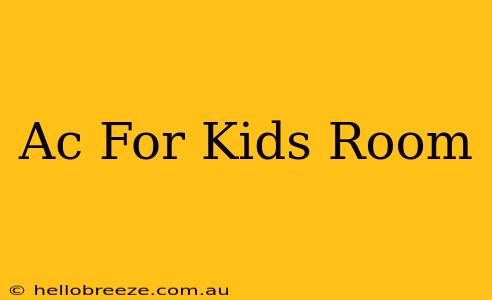Keeping your child comfortable and safe is a top priority, and that includes maintaining a comfortable temperature in their room. A properly functioning air conditioner can significantly improve sleep quality, reduce allergies, and create a healthier environment for your little one. But with so many options available, choosing the right AC for your kid's room can feel overwhelming. This guide will walk you through the essential factors to consider when selecting an air conditioner for your child's space.
Why an AC is Important for a Child's Room
Children are particularly sensitive to temperature fluctuations. A too-hot or too-cold room can disrupt their sleep, impacting their mood, development, and overall health. An air conditioner offers several key benefits:
- Improved Sleep: A consistently cool room promotes better sleep quality, leading to improved behavior and cognitive function during the day.
- Allergy Relief: Air conditioners can filter out allergens like pollen, dust mites, and pet dander, reducing allergy symptoms and respiratory issues.
- Temperature Regulation: Especially in warmer climates, an AC ensures a consistently comfortable temperature, regardless of external conditions.
- Healthier Environment: By removing humidity and circulating fresh air, an AC helps create a healthier environment for your child.
Factors to Consider When Choosing a Kids' Room AC
When selecting an air conditioner for your child's room, several factors are crucial:
1. Size and BTU Rating:
The most important consideration is the size of the room. The British Thermal Unit (BTU) rating indicates the cooling capacity of the AC unit. Too small an AC will struggle to cool the room effectively, while one that's too large will cycle on and off frequently, leading to uneven cooling and increased energy consumption. Use an online BTU calculator to determine the appropriate size based on your room's dimensions and insulation.
2. Type of Air Conditioner:
There are several types of AC units to choose from:
- Window Air Conditioners: These are affordable and easy to install, making them a popular choice for smaller rooms.
- Portable Air Conditioners: These offer flexibility as they can be moved from room to room. However, they are typically less efficient than window units.
- Mini-Split Systems: These are ductless systems offering efficient cooling and zoning capabilities, ideal for larger homes or rooms needing more precise climate control.
3. Safety Features:
Child safety is paramount. Look for AC units with features such as:
- Automatic Shut-off: Prevents accidental operation.
- Remote Control: Allows for convenient temperature adjustments without direct access to the unit.
- Secure Installation: Ensure proper installation to prevent accidents.
4. Noise Levels:
Children are sensitive to noise. Choose a unit with a low decibel rating to avoid disrupting their sleep. Many newer models offer quieter operation.
5. Energy Efficiency:
Look for an energy-efficient AC unit with a high Energy Efficiency Ratio (EER) or Seasonal Energy Efficiency Ratio (SEER) rating. This will reduce your energy bills and minimize your carbon footprint.
6. Maintenance and Cleaning:
Regular cleaning and maintenance are essential for optimal performance and longevity. Choose a unit that is easy to clean and maintain. Regular filter changes are vital for maintaining air quality and preventing the spread of allergens.
Choosing the Best AC for Your Child's Room: A Summary
Selecting the right air conditioner for your child's room involves careful consideration of size, type, safety features, noise levels, energy efficiency, and ease of maintenance. By prioritizing these factors, you can create a comfortable, healthy, and safe environment for your child to sleep, play, and thrive. Remember to consult with a qualified HVAC professional for personalized advice and professional installation. Investing in a quality air conditioner is an investment in your child's well-being.

